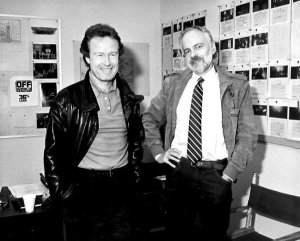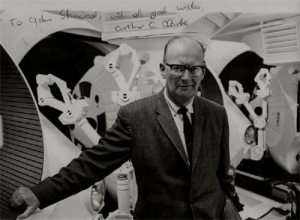What is science fiction? Spacecraft, phasers, and aliens? Cyborgs and genetic mutants? Post-apocalyptic imaginings of a mundane world starved of resources? Is it fantasy based on uncertain and potentially disastrous scientific advances, as in The Invisivle Man of H. G. Wells? Is science fiction strictly limited to any particular time period? Is it speculative science, like in the case of Arthur C. Clarke’s fantastic yet poetically practical fiction, dealing with the ships, computers, and technological puzzles of space travel? Is it a satirical social dissection of technological growth, like the stories of Philip K. Dick? Is it a morality play, like the ethical discourses embedded in the stories of Orson Scott Card and Star Trek: The Next Generation?
As Douglas Adams might say, the answers may not matter as much as the questions we pose. Genres are fluid. The storytelling of Ray Bradbury did not always deal in science or technology, but he is counted among the bright stars of the science fiction universe.
One of the most illustrative indicators of science fiction’s ascendancy is the proliferation of science fiction sub-genres and related genres. Some of the most common subgenres of science fiction are: hard SF, soft or social SF, cyberpunk, time travel, alternate history, military SF, superhuman, apocalyptic, space opera, space western, speculative fiction, fantasy, horror, mystery, and superhero. The list goes on. As the list grows, the question becomes more interesting: What is unique or distinctive about a narrative that qualifies it as science fiction?
Over the generations, science fiction narratives have grown to encompass most facets of popular storytelling. How can you tell if it’s science fiction or not? Is X-Men science fiction? How about Fight Club? What do you have in science fiction that you don’t have in any other genre? Philosophy? Nope. Social relationships? Nope. Class struggle? Nope. Warfare? Nope. Love relationships? Nope. None of these things are unique to science fiction, though they occur in science fiction.
The common thread running through the science fiction tapestry, from one end to the other, is the contemplation of currently fictional technology, powered by science. Fictional technology mediates the genre. A science fiction story is a technological fantasy, no matter what other subject it also treats on. A western about a railroad train is not science fiction. But a western about a malfunctioning android robbing a railroad train is a brand of science fiction. The technology must be currently fictional. A railroad train story before the invention of the steam engine would remain science fiction, grandfathered in for being predictive. Much like George Orwell’s predictive writing about two way telescreens. (Hello, Party sponsored livechat!)
You may ask: What about aliens? Aren’t alien stories uniquely characteristic of science fiction? Well, first show me a story involving human contact with alien life forms that does not involve fictional technology. The science fiction theme of alien life forms is simply how the genre addresses our philosophical theme of the Other. How is it right to treat people that you do not identify as part of your group?
For something to qualify as science fiction, technological environments must play a significant role in determining the characters’ dilemma. For fantasy stories the technology is manifest as magic, but it serves the same function. What do you see in sci-fi that you don’t see in other genres of literature? Fictional technology. Other literatures also ask questions about class struggle, philosophy, meaning of life, etc. The distinctive factor is that science fiction couches those narratives in the context of life-changing fictional technology, powered by science.
I leave you with a quote from the illustrious Isaac Asimov, who wrote an essay after publishing his Foundation novels, called “Social Science Fiction,” effectively forging the genre. In that essay Mr. Asimov defined science fiction as “that branch of literature which is concerned with the impact of scientific advance upon human beings.”1
1Isaac Asimov, “Social Science Fiction,” in Science Fiction: The Future, ed. Dick Allen (NY 1971), p. 272; reprinted from Modern Science Fiction, ed. Reginald Bretnor (NY 1953)
Further reading:
“Science Fiction: The Literature of Ideas,” by Marg Gilks, Paula Fleming, and Moira Allen. Published at Writing-World.com.





















great post! I was raised on Star Wars and Star Trek, and have always love Scifi. my super simplified version of a SF definition is that it’s “what if?”
That’s the stuff, Red! Thank you. I love the classic space sci-fi of Star Wars and Star Trek. I also loved Firefly – what an excellent refashioning of the space travel spirit.
You have done a wonderful job outlining the topic. Of course, the plethora of sub-genres does muddy the waters a bit…but who cares? It’s all good!
For me the key factor defining SF has been simply technology’s altering effect. How it changes the world in ways that are irreversible. Jay Lake call this, ‘Non-normative’ story telling. Too bad they call it Science Fiction, and not Technology Fiction. The latter is more appropriate from my point of view.
Too right, Saul. I like your “Tech Fiction” suggestion, quite apropos. Though the genre name may have an uphill climb catching on, now that “Science Fiction” has got its roots down.
Pingback: For The Science Fiction Enthusiast – Bradbury, Dick, Zelazny, & The Technological Trinity | My Writes
I have noticed that my Sci-Fi artwork was used in this article.
If you like it, you might check for more of my SF images on my website gallery :
http://www.graphique3d.republika.pl/
Thank you for the post, czarnyrobert! I’m glad to have an attribution for that lovely image. I’ve definitely been spending some time on your site since…
I love sci fi, having been brought up on Asimov. I find many authors wanting at present, but did enjoy the movie “interstellar”
It’s true, Quentin, as respected as sci fi has become, the market is consequently saturated with mid to low grade storytelling. But there are some great voices out there. Maybe check out the Sci Fi Summer Reading group book list for some ideas or discussions?
Well, hi…..I would like to see a sf novel that moved across galaxies
Hi Quentin! Galactic travel is a powerful thought. Stephen Hawking has described some tempting wormhole possibilities for such travel, but their occurances are subatomic, and so muniscule as to have no practical value. Interstellar travel would impress me sufficiently. I personally believe it is unlikely we will leave the solar system and that our fate is bound to Earth itself.
Reblogged this on Between Sisters, SVP!.
Thank you, Papatia! I’m glad you liked it. 😀
Welcome. It’s on point.
Pingback: “Bloodless; but it’s big in Uqbar.” | My Writes
Pingback: “Bloodless; but it’s big in Uqbar.”